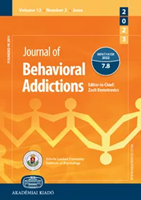Negative emotions mediate the association between the topology of the complex brain network and smartphone use disorder: A resting-state EEG study
Negative emotions mediate the association between the topology of the complex brain network and smartphone use disorder: A resting-state EEG study
Author(s): YULONG YIN, XU LI, Joseph T.F. Lau, SUNIAN NAN, MINGKUN OUYANG, Xiao CAI, Pengcheng WangSubject(s): Individual Psychology, Clinical psychology, Behaviorism, Substance abuse and addiction, Health and medicine and law
Published by: Akadémiai Kiadó
Keywords: smartphone use disorder; negative emotions; resting-state EEG; minimum spanning tree;
Summary/Abstract: Background: Increasing research has examined the factors related to smartphone use disorder. However, limited research has explored its neural basis. Aims: We aimed to examine the relationship between the topology of the resting-state electroencephalography (rs-EEG) brain network and smartphone use disorder using minimum spanning tree analysis. Furthermore, we examined how negative emotions mediate this relationship. Methods: This study included 113 young, healthy adults (mean age 5 20.87 years, 46.9% males). Results: The results showed that the alpha- and delta-band kappas and delta-band leaf fraction were positively correlated with smartphone use disorder. In contrast, the alpha-band diameter was negatively correlated with smartphone use disorder. Negative emotions fully mediated the relationship between alpha-band kappa and alpha-band diameter and smartphone use disorder. Furthermore, negative emotions partially mediated the relationship between delta-band kappa and smartphone use disorder. The findings suggest that excessive scale-free alpha- and delta-band brain networks contribute to the emergence of smartphone use disorder. In addition, the findings also demonstrate that negative emotions and smartphone use disorder share the same neural basis. Negative emotions play a mediating role in the association between topological deviations and smartphone use disorder. Discussion: To the best of our knowledge, this is the first study to examine the neural basis of smartphone use disorder from the perspective of the topology of the rs-EEG brain network. Therefore, neuromodulation may be a potential intervention for smartphone use disorder.
Journal: Journal of Behavioral Addictions
- Issue Year: 13/2024
- Issue No: 1
- Page Range: 120-133
- Page Count: 14
- Language: English

